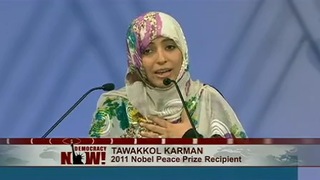
This year, the Norwegian diplomat Martti Ahtisaari won the Peace Prize. But in this season of peace, we look at the eleven women who have won the prize. We speak to Anne Ruffer, author of Peace Women. [includes rush transcript]
Transcript
AMY GOODMAN: This year, the Norwegian diplomat Martti Ahtisaari won the Peace Prize. But in this season of peace, I thought it would be interesting to look at the women who have won the Nobel Peace Prize. I spoke with Anne Ruffer, author of Peace Women.
ANNE RUFFER: Well, the first was an Austrian lady, Bertha von Suttner, her name. She got the prize in 1905 for starting the European peace movements.
Second was an American, Jane Addams, whom you may know, who founded the Hull House in Chicago or the settlement movement.
The third woman, again an American, in 1946, her name was Emily Greene Balch, a teacher who advised more than seven presidents and was one of the founders of the United Nations Declaration.
Then, the next in the line is two mothers from Ireland called Betty Williams and Mairead Corrigan Maguire. They got the prize in 1977 for the Irish peace movement to end the war in Ireland.
Next on the list is Mother Teresa, well known as the one, the nun, the Christian nun from Albania, born, who started to work with the people nobody wanted even to touch in India.
The next one is Aung San Suu Kyi, who got the prize in 1991, who won democracy now through elections in Burma but never became prime minister. Instead, she was sentenced to house arrest.
And the next on the line is the lady from Guatemala. Her name is Rigoberta Menchu. She got the prize in 1994 for her fight for the rights of the indigenous people of Guatemala.
Then there’s again an American named Jody Williams, who got the prize in 1997. She’s the one who started the anti-landmine campaign.
And there is a lady from Iran. Her name is Shirin Ebadi, who got the prize in 2003. She’s a lawyer and went to the prisons to fight for people who have no rights in Iran.
And the last one is called Mama Miti, Mother of the Trees, Wangari Maathai. She got the prize in 2004 as the Kenyan minister.
AMY GOODMAN: Anne Ruffer is the author of Peace Women, about the women who’ve won the Nobel Peace Prize. And just a note on Shirin Ebadi, the Iranian government just closed down the country’s main human rights group, her group, headed by Shirin Ebadi, the Center for the Defense of Human Rights in Tehran, was shut down hours before it was scheduled to hold a ceremony to commemorate the sixtieth anniversary of the Universal Declaration of Human Rights. The government accused the organization of carrying out illegal activities, such as publishing statements, writing letters to international organizations, and holding news conferences.












Media Options